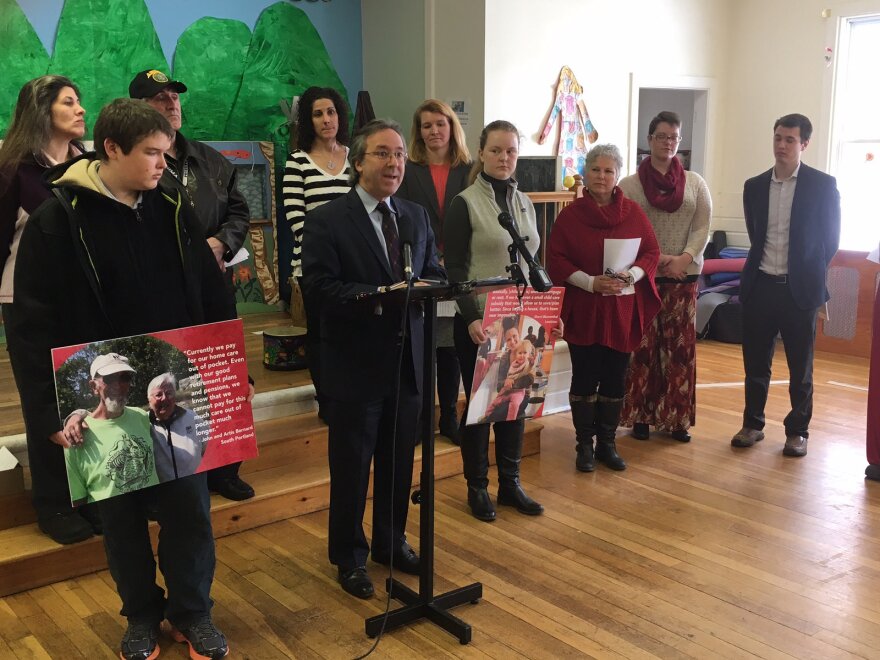Progressive lawmakers and caregiving advocates launched a campaign Monday to establish a Universal Family Care System in Maine. If approved by the Legislature, the system would provide childcare and home care services for all children, seniors and individuals with disabilities, regardless of income.
Supporters say the goal is to solve persistent problems facing Maine families in Maine, such as finding and paying for childcare. Speaking at a press conference in South Portland, single mom Tabatha Whalen says she had to shell out a third of her paycheck for a babysitter while her now 7 year old son was on a waitlist for Head Start childcare for nearly two years.
“I had to bring my son to work with me where he would hang out in the Dunkin’ Donuts lobby during my shift so that I wouldn’t lose my job,” she says.
There’s also the ongoing problem of providing care for seniors in Maine. Skip Worcester of Bangor says when his mom needed help with daily tasks, his family was forced to move her into a nursing home, away from her husband, where he says she deteriorated.
“For many seniors, the assistance of home health care aides is what makes the difference between continuing to live independently at home or be forced into assisted living,” he says.
And then there’s the longstanding issue of paying care providers adequately, says Lori Moses, executive director of the Catherine Morrill Day Nursery in Portland.
“Essentially, the low wages of the childcare workers subsidize the entire childcare system,” she says.
Some lawmakers and advocates see a connection between these problems and have devised a solution. Ben Chin of the Maine People’s Alliance says Maine needs to create a Universal Family Care System.
“Every family in Maine would be able to get childcare for every kid under 4. And every senior, every person with a disability, would be able to get home care when they need it. It would be regardless of income,” he says.
Essentially, it treats senior and early childcare like public education: everyone can access it. It would be funded, Chin says, by enacting a 6 percent payroll tax on high incomes.
“Our plan closes the payroll tax loophole, which allows the wealthy to avoid paying payroll taxes on the vast majority of income they make over $118,000 dollars. This solution raises over $400 million each year,” he says.
Enough, Chin says, to provide universal care to all Maine children, seniors and people with disabilities, as well as to boost caregivers’ wages to ensure a stable, well-trained workforce.
Democratic state Rep. Heather Sanborn, who is sponsoring a bill to establish universal childcare, says it would benefit families and the state, which is grappling with an aging workforce.
“We have to make Maine the place that young families seek out to raise their kids and make their careers. What if Maine were the place in the country where parents could continue to develop their careers while also being able to afford high-quality care for their preschool-aged kids?” she says.
Supporters say they expect political resistance to such a sweeping plan. But Democratic state Rep. Drew Gattine, who is sponsoring a bill to establish the Universal Family Care System, says he thinks it’s time for bold action.
“You hear Democrats and Republicans and independents, and you hear people in the executive branch and in the Legislature talk all the time about, ‘We need to help people with disabilities. We need to do more for our seniors. We need to make sure that our kids show up to school ready to learn,’” he says. “What’s frustrating is we nibble around the edges. We do small things here and there. Provide a little funding here a little bit of funding there, but at the end of the day, we’re not getting much traction around really solving the problem.”
If approved, the system would be phased in over four years and fully implemented in 2021. But the proposal first awaits scrutiny — and debate — in the Legislature.



